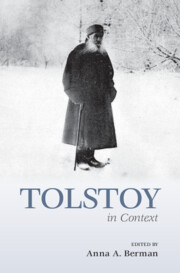Book contents
- Tolstoy in Context
- Tolstoy in Context
- Copyright page
- Contents
- Figures
- Notes on Contributors
- Preface
- Acknowledgments
- Note on Citations, Translations, and Transliterations
- Chronology
- Part I The Man
- Part II Russian Social and Political Contexts
- Chapter 5 Peasants and Folklore
- Chapter 6 The Great Reforms
- Chapter 7 Nobility and the Russian Class System
- Chapter 8 The Russian Orthodox Church
- Chapter 9 Law
- Chapter 10 Politics
- Chapter 11 War and the Military
- Chapter 12 Tolstoyans
- Chapter 13 Clothing
- Chapter 14 The “Woman Question”
- Chapter 15 The Family
- Part III Literature, the Arts, and Intellectual Life
- Part IV Science and Technology
- Part V Beyond Russia
- Part VI Tolstoy’s Afterlife
- Suggested Further Reading
- Index
Chapter 11 - War and the Military
from Part II - Russian Social and Political Contexts
Published online by Cambridge University Press: 05 January 2023
- Tolstoy in Context
- Tolstoy in Context
- Copyright page
- Contents
- Figures
- Notes on Contributors
- Preface
- Acknowledgments
- Note on Citations, Translations, and Transliterations
- Chronology
- Part I The Man
- Part II Russian Social and Political Contexts
- Chapter 5 Peasants and Folklore
- Chapter 6 The Great Reforms
- Chapter 7 Nobility and the Russian Class System
- Chapter 8 The Russian Orthodox Church
- Chapter 9 Law
- Chapter 10 Politics
- Chapter 11 War and the Military
- Chapter 12 Tolstoyans
- Chapter 13 Clothing
- Chapter 14 The “Woman Question”
- Chapter 15 The Family
- Part III Literature, the Arts, and Intellectual Life
- Part IV Science and Technology
- Part V Beyond Russia
- Part VI Tolstoy’s Afterlife
- Suggested Further Reading
- Index
Summary
The chapter asks why an avowed pacifist wrote so many works, not all completely negative, about war. It begins with Tolstoy’s personal connection to the military, through both his family background and his own service. It describes the two wars in which he fought: the Long Caucasian War (1817–64) and the Crimean War of 1853–6, and it explains how he came to write War and Peace about the Napoleonic Wars of the early nineteenth century. It then turns to other conflicts (the 1877–8 Russo-Turkish War and the 1904–5 Russo-Japanese War) and military alliances (among others, the 1891–1917 Franco-Russian Alliance) in which Russia was involved during Tolstoy’s lifetime. Russia had been an empire since the conquest of Kazan in 1552, and all its external wars during Tolstoy’s lifetime were related to imperialism. Tensions with Germany simmered over many years. Finally, the failure after emancipation in 1861 to integrate the peasants into a new, just society created conditions for civil war that intensified in the late 1870s and led to the assassination, in 1881, of Alexander II and the revolution of 1905. The essay summarizes Tolstoy’s reactions to all these different kinds of war and warlike conditions.
Keywords
- Type
- Chapter
- Information
- Tolstoy in Context , pp. 85 - 92Publisher: Cambridge University PressPrint publication year: 2022

